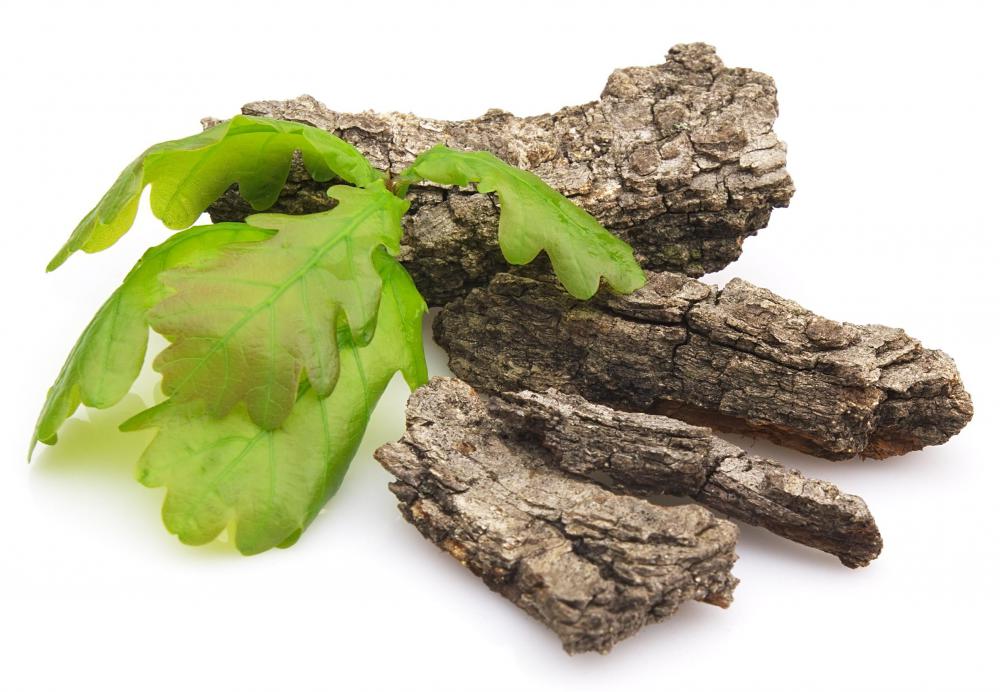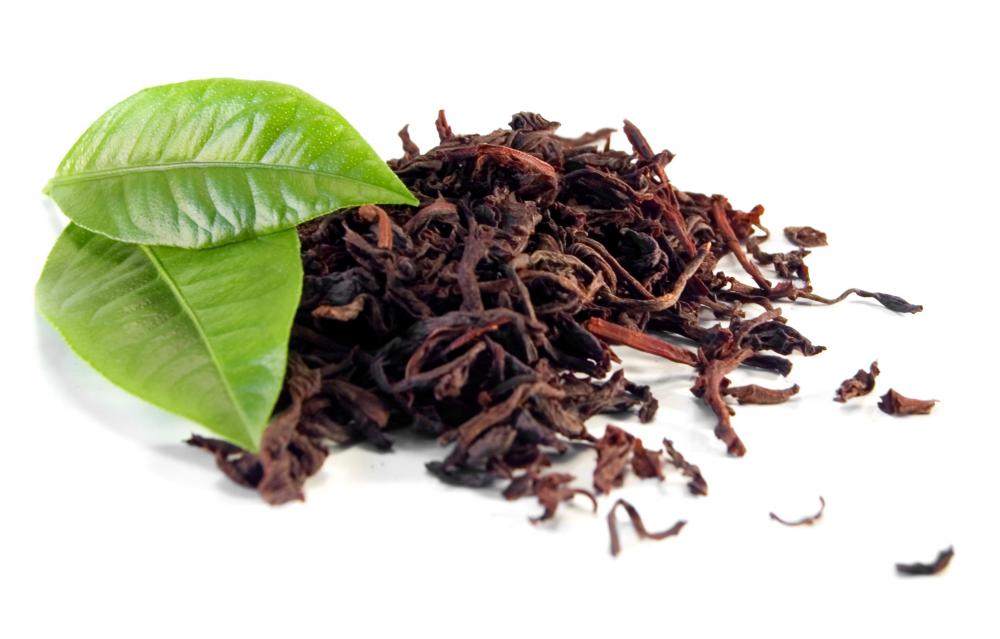At DelightedCooking, we're committed to delivering accurate, trustworthy information. Our expert-authored content is rigorously fact-checked and sourced from credible authorities. Discover how we uphold the highest standards in providing you with reliable knowledge.
What is Tannin?
Tannin is a substance found naturally in many different plants, most notably in grapes, tea leaves, and oak. The word comes from the historical practice of extracting this compound from oak bark to tan leather, although in the modern world, synthetic forms or other chemicals are usually used instead.
This substance is found in the skins, seeds, and stems of grapes. Wine that is fermented while still in contact with these parts of the grape — red wine — absorbs some of the tannin, which lends a distinct character to the wine. Because the tannin in the seeds of grapes is particularly harsh, wine is usually crushed rather than pressed, to minimize its absorption. Many wines also absorb some from the oak barrels they are aged in, which lends additional flavor to the wine.

Tannin is crucially important to the complexity of a wine and how well it will age over time. Wines that have high amounts tend to age best for long periods of time, such as those made from the Cabernet Sauvignon, Nebbiolo, and Syrah grapes. When young, these wines often seem searing, creating a sensation of dryness in the mouth, particularly the roof of the mouth. The most tannic of wines cause the mouth to pucker, which is not necessarily a pleasant experience.

Over time, however, the tannin acts as a preservative and mellows, helping the wine to grow into its complexity and become truly exceptional. A well-made, high-tannin wine, which may be virtually undrinkable when young, can become a masterpiece of a wine later in life. That said, some wines are simply too tannic, and by the time their astringency fades, the wine will have passed its prime.

One thing that can help wines that possess a high amount of tannin more palatable is to combine them with high-fat and protein foods. Milk fits this role ideally, helping to soften the sharp edges of the drink. This is one reason so many people add milk to strong teas, which are also very high in tannin. Good cheeses or a hearty cream sauce can turn a wine that at first blush appears too tannic into the perfect pairing.

In general, the trend in winemaking is towards wines with less tannin than 50 years ago. These wines are easier to drink upon purchase or within a short year or two after buying them, and so are more suited to the new global wine market. To be well-rounded in the world of wine, however, it is a good idea to sample a number of wines with higher levels to taste the nuance that this substance can add.
AS FEATURED ON:
AS FEATURED ON:















Discussion Comments
Try medura tannin free tea.
@MrsPramm - You're right that it can be dangerous to experiment with recipes for any kind of alcohol, although I think most of the time spoiled wine is easy to spot.
But, you can actually use tea for tannin if you have to when fermenting wine. The recipe I've seen calls for one tablespoon of "strong" tea per gallon of must. But it's not going to taste as good as if you use proper wine tannin, which is fairly cheap from wine-making stores.
@tamsin - I wouldn't try it. You'll have to either order some tannin powder or use real grapes (which have tannin in their skin and seeds).
Making your own alcohol is a tricky business at the best of times and substitutions, such as tea tannin for grape tannin, can cause all kinds of changes in the flavor and possibly in the safety of your wine. I know even using water from a different area can make a huge difference.
Plus, I'm not even sure if it would work to use tannin water from tea like that.
@anon10467 - I believe that any red wines are supposed to generally be good for your heart and your health, because they contain some compounds from the grapes that have various health benefits.
I think wine also has a way of making your blood thinner, so that you are less likely to have a heart attack.
However, this is all true of moderate consumption (no more than 1-2 glasses per day) and having more than this will raise up your chances of heart disease and other problems.
Apparently tannins can do some good for a person as well, such as when they are eaten with chestnuts, but I'm not sure if that's been studied in wine.
There are different types of tannins. Hydrolyzable, non-hydrolyzable. They may have different properties.
really it is a useful bioproduct but has some harmful effects if taken in large amounts.
Apparently, tannin stains the porcelain on toilet bowls (long story), and pretty much anything else it comes in contact with, so possibly, yes.
"will tannin stain stainless steel?"
no it's stainless!
will tannin stain stainless steel?
I have a recipe for home made wine, necessary because I live in Thailand which imposes an extortionate tax on wine, imported or otherwise, never mind the moonshine LOL. The recipe (online from the US) calls for a teaspoon of tannin. What could I substitute this for? A teabag?
is it true that merlot is good wine because it's also good for blood pressure? how does this work, will it lower your blood pressure thanks
Post your comments